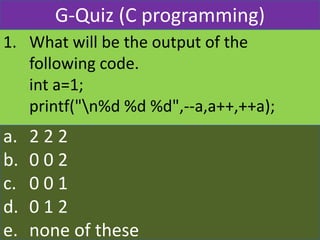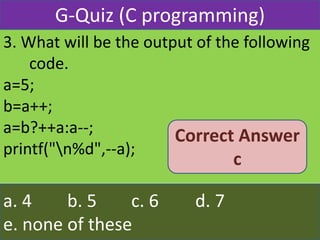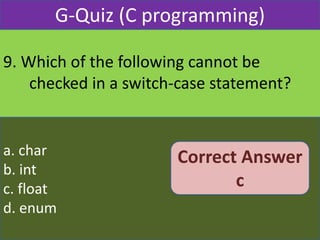G quiz
- 1. 1. What will be the output of the following code. int a=1; printf("n%d %d %d",--a,a++,++a); a. 2 2 2 b. 0 0 2 c. 0 0 1 d. 0 1 2 e. none of these G-Quiz (C programming)
- 2. 1. What will be the output of the following code. int a=1; printf("n%d %d %d",--a,a++,++a); a. 2 2 2 b. 0 0 2 c. 0 0 1 d. 0 1 2 e. none of these G-Quiz (C programming) Correct Answer a
- 3. 2. Which loop is called as exit controlled loop? a. while b. do-while c. while(1) d. for e. none of these G-Quiz (C programming)
- 4. 2. Which loop is called as exit controlled loop? a. while b. do-while c. while(1) d. for e. none of these G-Quiz (C programming) Correct Answer b
- 5. 3. What will be the output of the following code. a=5; b=a++; a=b?++a:a--; printf("n%d",--a); a. 4 b. 5 c. 6 d. 7 e. none of these G-Quiz (C programming)
- 6. 3. What will be the output of the following code. a=5; b=a++; a=b?++a:a--; printf("n%d",--a); a. 4 b. 5 c. 6 d. 7 e. none of these G-Quiz (C programming) Correct Answer c
- 7. 4. Which of the following special symbol allowed in a variable name? a. * (asterisk) b. | (pipeline) c. - (hyphen) d. _ (underscore) G-Quiz (C programming)
- 8. 4. Which of the following special symbol allowed in a variable name? a. * (asterisk) b. | (pipeline) c. - (hyphen) d. _ (underscore) G-Quiz (C programming) Correct Answer d
- 9. 5. How many times "IPL" is printed? #include<stdio.h> int main() { int x; for(x=-1; x<=10; x++) { if(x < 5) continue; else break; printf("IPL"); } return 0; } G-Quiz (C programming) a. Infinite times b. 11 times c. 0 times d. 1 time
- 10. 5. How many times "IPL" is printed? #include<stdio.h> int main() { int x; for(x=-1; x<=10; x++) { if(x < 5) continue; else break; printf("IPL"); } return 0; } a. Infinite times b. 11 times c. 0 times d. 1 time G-Quiz (C programming) Correct Answer c
- 11. 6. Which of the following is not logical operator? a. & b. && c. || d. ! G-Quiz (C programming)
- 12. 6. Which of the following is not logical operator? a. & b. && c. || d. ! G-Quiz (C programming) Correct Answer a
- 13. 7. Which bitwise operator is suitable for turning off a particular bit in a number? a. && operator b. & operator c || operator d. ! operator G-Quiz (C programming)
- 14. 7. Which bitwise operator is suitable for turning off a particular bit in a number? a. && operator b. & operator c || operator d. ! operator G-Quiz (C programming) Correct Answer b
- 15. 8. In mathematics and computer programming, which is the correct order of mathematical operators ? G-Quiz (C programming) a. Addition, Subtraction, Multiplication, Division b. Division, Multiplication, Addition, Subtraction c. Multiplication, Addition, Division, Subtraction d. Addition, Division, Modulus, Subtraction
- 16. 8. In mathematics and computer programming, which is the correct order of mathematical operators ? G-Quiz (C programming) a. Addition, Subtraction, Multiplication, Division b. Division, Multiplication, Addition, Subtraction c. Multiplication, Addition, Division, Subtraction d. Addition, Division, Modulus, Subtraction Correct Answer = b
- 17. 9. Which of the following cannot be checked in a switch-case statement? G-Quiz (C programming) a. char b. int c. float d. enum
- 18. 9. Which of the following cannot be checked in a switch-case statement? G-Quiz (C programming) a. char b. int c. float d. enum Correct Answer c
- 19. 10. Which of the following are unary operators in C? 1. ! 2. sizeof 3. ~ 4. && G-Quiz (C programming) a. 1, 2 b. 1, 3 c. 2, 4 d. 1, 2, 3
- 20. 10. Which of the following are unary operators in C? 1. ! 2. sizeof 3. ~ 4. && G-Quiz (C programming) a. 1, 2 b. 1, 3 c. 2, 4 d. 1, 2, 3 Correct Answer d



















